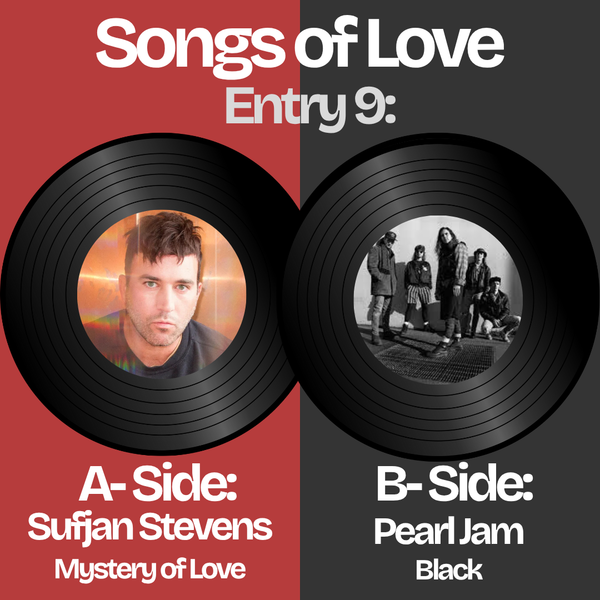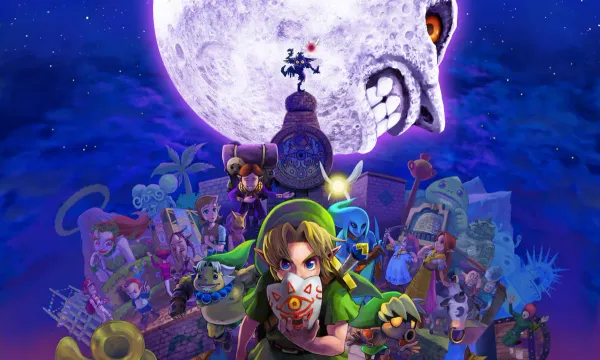Hades 2: Time Heals All Wounds?
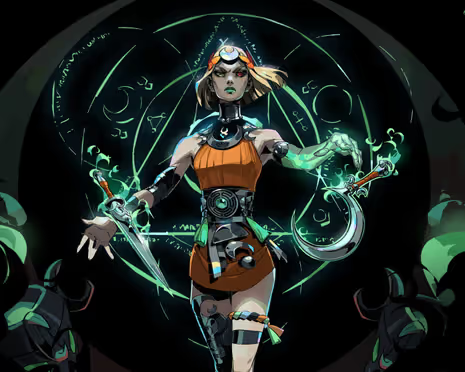
The following will contain spoilers for both Hades and Hades 2 at least up to the end credits of both.
Hades 2 is one of those sequels that is, at base, evolutionary rather than revolutionary, to use a critical cliché. Its basic gameplay loop is much the same as its predecessor, in its roguelike journeys through the underworld (and the surface, in this case), where inevitable failure gradually provides the tools for future success. Many characters return, with updated art, and main character Melinoë controls very much like her brother Zagreus, though the two have quite different personalities – specifically, Melinoë doesn’t feel the need to crack wise with every other sentence, and thank Olympus for that[1].
But one similarity that is less immediately obvious, but equally fundamental, concerns the plot. Both games ultimately wrong-foot the player in terms of what they’re about. Hades appears initially to be a game about escaping an abusive environment, but ultimately turns out to be about forgiveness and the importance of holding loved ones close. Hades 2 frames itself as a revenge story (Nemesis, goddess of retribution, is even a possible love interest for Melinoë), but ends up being about intergenerational trauma and escaping cycles of abuse.
The first game is relatively straightforward in this regard. As it begins, Zagreus is attempting to escape the underworld, an attempt which (unless the player is extraordinarily skilled) is foiled. Over successive attempts, we discover that he is trying to get away from his father, Hades, and later that he is trying to reach his mother, Persephone, whom he has never known, on the surface. Hades is depicted as a harsh taskmaster who treats Zagreus as a servant, or employee, and the Olympian gods are attempting to help Zagreus escape (though most are unaware of the reasons or circumstances). It seems a straightforward case of escaping an abusive, or at least domineering, father in search of the possibility represented by an idealised mother figure.
But as the game wears on, we start to see new sides of the story. Hades, who keeps a picture of Persephone in his bedroom, is not as uncaring as he first appeared. This is in fact perhaps my favourite depiction of Hades of the many, many modern takes on Greek myth, actually: a spiky, difficult man who cares deeply about his work (in stark contrast to what he sees as the fecklessness and benign neglect of many of his family, including, as it turns out, Zagreus), whose harsh façade covers the fact that he is perhaps the most sensitive of the gods. Persephone was not driven away by his coldness, but by Zagreus’s apparent death as an infant, and ultimately she and Hades are reunited, thanks to their son’s efforts, to make another go of their marriage, while Zagreus himself becomes a (mostly) valued member of the House of Hades staff, having found his niche as security consultant.
These ideas of forgiveness and bringing family back together are not limited to the game’s main plot. Achilles, Zagreus’s teacher, is separated from his lover Patroclus after the events of the Iliad, but the two can be brought together through atonement and recognition of their mutual need for each other. Nyx, another of Zagreus’s mentors, can be brought together with her parent Chaos after a long period of separation. The main post-credits plot revolves around pacifying the Olympian gods, to whom Zagreus had been lying about the purposes and nature of his quest, but ultimately the family comes together for a feast in the Underworld.
Hades 2 picks up from this very point, in fact: as that game begins, the Olympian family are closer together than ever (well, mostly) to defend from a new threat assailing them, while Hades’s own immediate family has been torn apart. Both these things are the result of the attack of Chronos, the Titan who has reconstituted himself after being cut into pieces and spread through the Underworld. It is up to Melinoë, daughter of Hades and Persephone who has grown up without her family since Chronos’s attack, to set all of this right.
Throughout the game, the elder generation of gods – Zeus, Poseidon, Hera, Hestia, Demeter and Hades – all express their derision and disdain for Chronos at various points, being his children[2]. Chronos himself has long been a metaphor for parental abuse and overweening authority – the image of him eating his children (as in the famous Goya painting, among others) is simply too good to pass up in this regard. Hades 2 largely avoids any detail of what exactly Chronos actually did to his children, which is probably wise since it would make its ultimate move in regard to him harder to achieve.
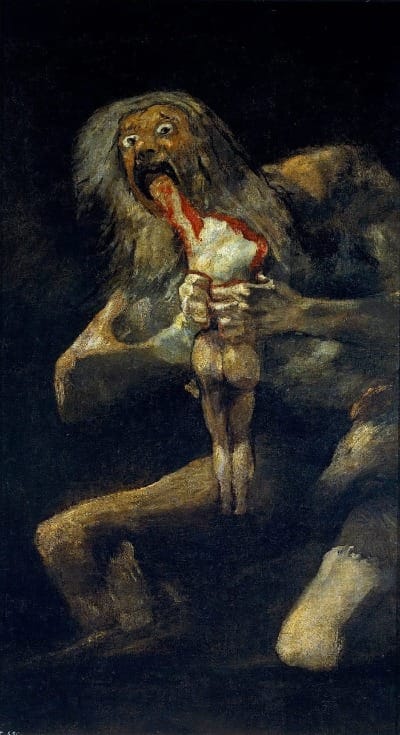
Rather, it concentrates on him as a tyrant, and something of a demagogue. Chronos has swayed various individuals to his cause, along with an army of satyrs, promising a golden age for mortals in contrast to the yoke of the gods. The extent to which he actually believes in this is never quite spelled out, but seems doubtful given his general pettiness and focus on revenge (a mirror of Melinoë’s own). But the game also suggests throughout that the Olympians, Chronos’s children and grandchildren, have not escaped his influence as far as petty authority goes. A number of the characters, notably Prometheus [3] and Arachne, remind Melinoë of the gods’ arbitrariness and callousness in dealing with mortals, a lesson she finds difficult to take to heart amid her struggle on the gods’ behalf. It’s a clever and a brave choice, to make the Olympians broadly sympathetic without losing sight of the fact that most of Greek myth has to do with their misdeeds (though thankfully some of the more vivid ones involving Zeus and Poseidon in particular, and the conception of their many children, are notable by their absence). As bad as Chronos is, he’s not wrong that the gods – even the ones, like Athena, who seem most admirable to Melinoë and Zagreus - have treated mortals poorly on the whole.
Indeed, the game wants the player to think of Zeus and family as a continuation of Chronos’s legacy in several respects. In a neat visual twist, when Melinoë arrives in Chronos’s broken and ransacked version of the House of Hades, the mural behind what used to be Hades’s throne has been broken, revealing an earlier image of Chronos beneath. Just to underscore the message, the mural is broken such that Chronos’s head appears on Hades’s body. Something of what Chronos does and who he was underlies all that the Olympians do – even Hades, who likes (with some justification) to think of himself as apart).
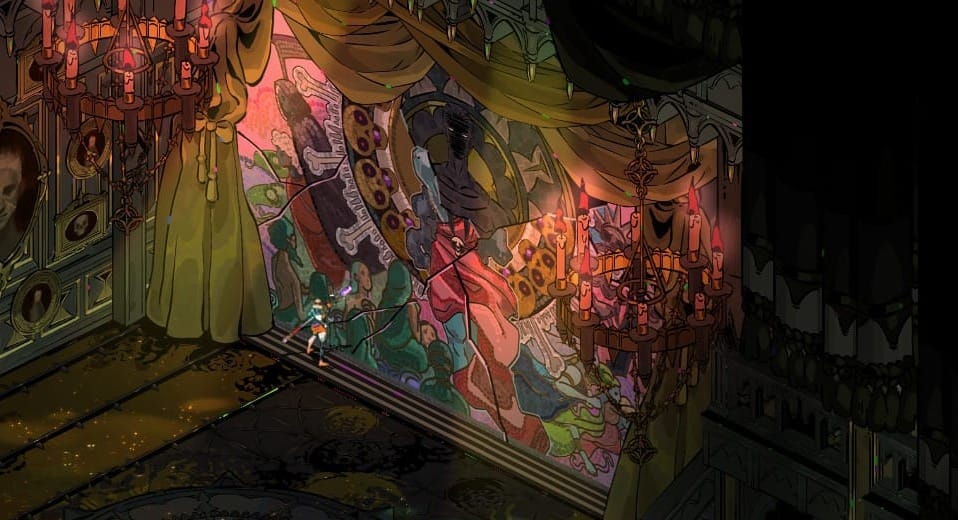
As Zagreus did with Hades in the first game, Melinoë must defeat Chronos a number of times. Each time she does, she is able to contact Zagreus in the past and convince him to help her by destroying Chronos as he is reconstituting, before his attack on the House of Hades. Zagreus, though, not driven by revenge and bitterness having not experienced Chronos’s attack, offers the Titan a choice, and in so doing implants in him a possibility of a time in which he was a loving grandfather to Melinoë. The present Chronos, remembering this possibility as though it really happened, becomes increasingly penitent and frees his son and family from captivity. Notably, Hades, given the option, wants to spare his father – a far cry from the harsh, authoritative figure we saw at the beginning of the first game. The implication is that Hades, having been through his own struggle with his son, understands the degree to which he is subject to Chronos’s legacy, and realises that the only way forward is to break the cycle of retribution.
Indeed, the necessity of change is an underlying theme of the game. Eris, the goddess of strife whose golden apple kicked off the fall of Troy, is a major character, and one who seeks to constantly undermine the established order in various respects. Prometheus, a figure who so often stands for change and innovation in art[4], refers to Melinoë as “agent of change.” Although Melinoë fights to safeguard the order of Olympus and the Underworld, many of the characters around her question, implicitly or explicitly, the justice of that order. Melinoë’s witch allies, especially Circe, are often concerned with change and growth. While the historical setting of the game is, in keeping with the spirit of myth, extremely vague, there’s a sense at times that the wider world is in a state of change and flux. The absence of the three Fates is a major plot point, and while part of Melinoë’s charge is to locate them, there’s a sense that without an established idea of destiny, there are spaces for new possibilities to emerge.
There’s perhaps a contradiction around that idea of change in Chronos’s rehabilitation, though. On the one hand, Chronos himself reforms and resolves to work with his children and grandchildren to undo the harm he has caused. So we have change and growth on a personal level, in an intelligent and compassionate bit of writing. But in doing so, he works with Melinoë to undo rogue timelines and states of possibility. This is a neat way to keep the game going ad infinitum – there will always be a timeline where Chronos must be fought – but it does mean that for all the emphasis on change and potentiality, Melinoë’s job is ultimately to restrict possibility, to prune it down into the one approved state of being. While doing so means allowing for Chronos himself to do good and correct his mistakes, it does end up perilously close to being thematically incoherent.
Indeed, as satisfying and laudably ambitious as the game’s writing is for the most part, I do have a couple of issues with this resolution. For one thing, it’s rather too quick and easy, especially in comparison with the first game. Hades’s softer side is revealed gradually, over many interactions and hours of gameplay, culminating in his standing aside rather than fight Zagreus, a moment which feels thoroughly earned in both plot and gameplay terms, after many difficult battles against him. Chronos, on the other hand, changes rapidly, in a way that is broadly mysterious even to himself, going from a ranting tyrant who mocks Melinoë at every turn to a kindly grandfather figure (who is cleverly referred to in the caption under his name as “Father Time”). The change itself isn’t bad, but the rapidity with which it occurs isn’t entirely satisfying.
The other issue might be more of a personal one, given my anti-Zagreus bent, but I still think it’s notable. Melinoë is all for killing Chronos, her sole aim and mission. It is Zagreus who suggests trying to talk him down and ultimately does so in the past (albeit through threats as much as reason). This makes perfect character sense: Zagreus, surrounded by a loving and stable family, has come to understand the value of forgiveness in a way that is alien to Melinoë, who has grown up without a family, hardened by her circumstances. Like the first game, it’s a victory for compassion. The problem is that it’s rooted in an active choice by a character who’s barely featured in this game up to this point. Despite a player’s assumed fondness for him from the first game, Zagreus really isn’t in Hades 2 much, so to have him be the source of such a vital turning point in the plot sticks in the craw slightly. Again, it just doesn’t quite feel earned.
The thing is, these are issues of execution rather than ideal, for which I’m willing to overlook them. Because I fundamentally admire and respect the choice to have these games centre so much around forgiveness and compassion. Greek myth, conceived in a time of frequent warfare and general violence, is heavy on bloodshed and cruelty – its most famous poem centres around war and kicks off with an exchange of slaves. But while blood is central to both Hades games – Zagreus is ultimately revealed to be the god of blood; Titan’s blood is an upgrade item in the first game; Hades’ favourite oath, inherited by both his children, is “blood and darkness” – the emphasis here is on blood as lifegiving, and on blood ties, rather than its spilling, as expressed in Hades’s end credit song, the magnificent ‘In the Blood.’
All of the above might seem like I think Hades 2 is lesser than its prequel, which is not the case. In gameplay terms, it’s an improvement, bigger and better, with more options available to the player in finding that perfect build, and even more characters to interact with; in particular, there’s a nice blend of returning and new characters. The visual style has been refined, and much of the character artwork in particular is extraordinary[5]; Zeus’s hair, which billows like a thundercloud, somehow amazes me every time I see it. Darren Korb’s music may be even stronger than the first game, striking a nice balance between recalling that game’s major motifs with different instrumentation and creating something new (the Sirens’ songs regularly get stuck in my head); in particular, there’s an impressive range of musical styles to represent a range of locations and characters. And the story, for all my quibbles, is more ambitious than its predecessor without losing focus on its central goal and themes. It’s a genuinely intelligent, witty and reflective take on Greek mythology, at a time when bestseller charts are swamped with mythological reinterpretations, that takes mythology on its own terms without being slavish to its details. It feels like an evolution of that mythology, rather than a hot take on an original text. Which is, for me at least, just how this sort of thing should be.
[1] When Zagreus shows up in the sequel, there was a point where I actually resorted to telling him aloud to shut up, because his “witty” banter at critical moments was getting on my nerves so badly.
[2] Although, in order to avoid the incestuous marriages of Zeus and Hera and indeed Hades and Persephone, both games have Zeus, Poseidon and Hades as Chronos’s biological children, and the other three as their foster-sisters.
[3] Voiced, incidentally, by Ben Starr, who also plays Verso in Expedition 33, and is therefore having a hell of a year for playing traumatised immortals who know too much for their own well-being.
[4] The readiest example being Frankenstein’s subtitle: “The Modern Prometheus.”
[5] And yes, much like in the first game, most of the characters are extremely attractive. This is less relevant to my purposes here, but is certainly a noteworthy feature of the game.

